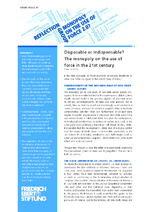Think Piece No. 7: Disposable or Indispensable? The monopoly on the use of force in the 21st century
Summary
- Does the increasing power of non-state armed groups and their willingness to challenge states fundamentally undermine the international system? The answer is both yes and no.
- The monopoly on the use of force is often more theoretical than real. Some states have voluntarily outsourced their powers of coercion and there are also areas of coercion (such as cyberwarfare) where a state monopoly has yet to be effectively established.
- Most importantly, “states” have been fundamentally complicit in the privatization of weaponry and have often also tended to exploit private circuits of violence (commercial as well as non-commercial) for their own purposes.
- The implication of states in the privatization of the means of violence takes three forms: i) states trade their monopoly of coercion in pursuit of geopolitical and other objectives; ii) states actively (if covertly) sponsor non-state armed groups as tools of repression or proxies; iii) private actors alter the “strategic balance” by wresting control over the instruments of force from states.
Hutchful, Eboe
Disposable or indispensable?
Berlin, 2016
Zum Download (PDF) (200 KB, PDF-File)
Latest Issues
- Mely Caballero-Anthony, Frieden und Sicherheit | Publikation
Think Piece 22: Security in Times of Uncertainty in Asia
Asias security outlook still appears to be laden with uncertainties. From the changing dynamics in the balance of power, an emboldened North Korea and…
- Ann L. Phillips, Frieden und Sicherheit | Publikation
Think Piece 21: Providing Security in Times of Uncertainty
The final report, distills the findings of a two-year effort by more than 20 international experts to find answers on how to overcome rising…
- Jaïr van der Lijn, Publikation
Think Piece 20: The future of the monopoly on the legitimate use of force - Four alternative global futures
The paper presents four alternative global futures for the monopoly on the legitimate use of force that aim to allow policy makers to embrace…
